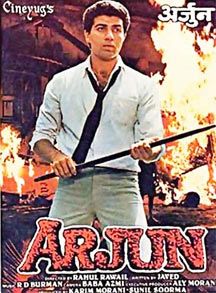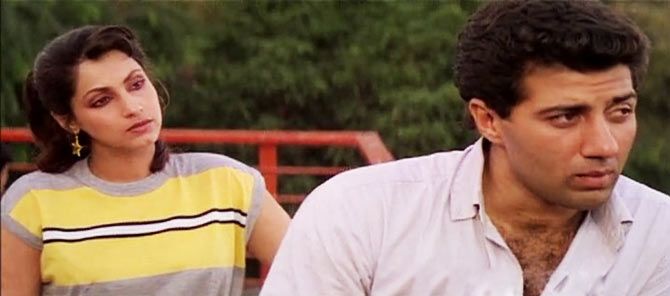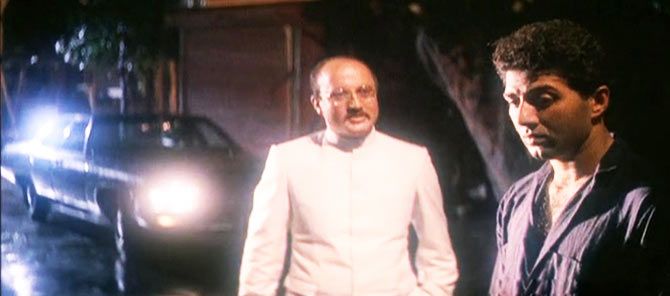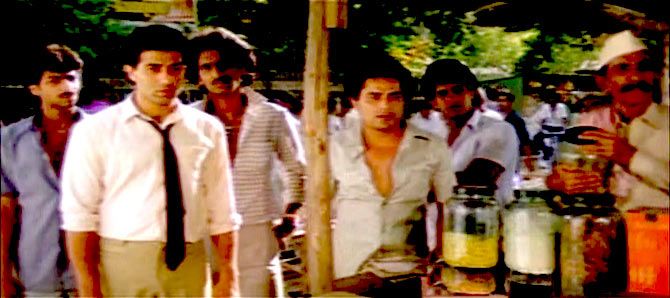 In our special series re-visiting great Hindi film classics, we look back at Sunny Deol and Dimple Kapadia starrer Arjun (1985).
In our special series re-visiting great Hindi film classics, we look back at Sunny Deol and Dimple Kapadia starrer Arjun (1985).
The angst and frustration of Arjun Malvankar resonated with an entire generation of youngsters.
Manish Rathore, a businessman in Lucknow and one of the greatest movie enthusiasts I know, holding a rich archive of magazine cuttings and yesteryear knowledge, calls it the ‘Zanjeer of my youth.’
He was 17 years old when Rahul Rawail’s 1985 offering, Arjun hit the screens and watched it more than half a dozen times at a Sion theatre during an extended stay in Mumbai. The teenager saw his own extension in leading man Sunny Deol’s simmering eyes and festering rage. It’s also the first time he appreciated the dynamics of filmmaking.
Rathore is not alone.
Calling it the movie that “changed her life” choreographer-turned-filmmaker, Farah Khan credits the still slick, still gritty Arjun for her aspiration to get behind the camera.
Seeking justice single-handedly isn’t new but what sets Arjun apart is how shrewdly writer Javed Akhtar (post Salim-Javed split) constructs a specific milieu, its growing unrest and plays on the politics of it.
The film opens in a straightforward manner -- black background, white font, zero sound, cuts to a rushing ambulance escorted by half a dozen police vehicles carrying a badly wounded Deol for an emergency operation.
Told in flashback, Akhtar’s story is woven around its titular character Arjun Malvankar, an unemployed graduate residing in a rundown chawl of a bustling basti with his gutless father (A K Hangal), cantankerous stepmom (Shashikala) and sympathetic stepsister (Supriya Pathak).
Despite his mother’s relentless (somewhat exaggerated) derision, Arjun doesn’t harbour ill will.
“Baat sagey ya sautele ki nahi hai, bekaar aadmi kisi ko bhi bojh lagne lagta hai,” he reasons with his close friend, the whistler Mohan (Satyajeet) who stars in the film’s most iconic, most thrilling sequence -- the one with all the black umbrellas and sword-held charging goons in pouring rain against RD Burman’s frantic chant of Haw Haw Huh-Huh-Huh-Haw.
Arjun’s band of brothers comprises of four other equally down-on-luck cronies but other than Mohan only Chander (Raja Bundela) gets a few extra scenes to stand out.
What certainly does is Rawail’s depiction of Mumbai, its sturdy landmarks, congested town side, flourishing suburbs and disrupting monsoons with abundant scenes filmed on the streets lending the narrative a realism, a tangibility.
Always a city of crowd and corruption, Arjun is set in Bombay, not Mumbai, around a time when mills were functional and workers thronged to matka gambling centres even as power-hungry politicians collaborated with ambitious industrialists to demolish slums/mills and construct high rises -- it’s disturbing to note how much success they achieved in the last 30 years.
Hit by a strong urge to act on his impulses and vent the bubbling irritation triggered by society and strained family ties, Arjun beats up a bunch of ruffians roughing up a poor shopkeeper for failing to submit hafta. Here I must add how spontaneous his outburst is, precisely the reason why it is so effective too. (A spotting of Jackie Shroff’s Hero poster plastered on a rundown wall lends it a nice touch.)

The incident brings him in the eye of the lawmakers, breakers and observers.
Cop (Jagdish Raj) warns him of dire consequences, the trounced party’s leader Ranga (Goga Kapoor) exercises good old intimidation tactics and a considerate schoolteacher (Dimple Kapadia) requests his assistance in rescuing her maid from a land-grabbing bully.
“Ab tu is area ka registered dada ho gaya hai,” wisecracks Mohan.
There’s no place for humour in Arjun’s bleak storytelling. Life is too difficult and messy in these parts and Arjun feels its greatest hit when he loses Mohan in the aforementioned umbrella-slaughter scene.
No histrionics, no dialogues, Deol’s Arjun broods in silence, staring endlessly at his deceased buddy’s chalked outline, slowly washed away by the deluge of unfeeling rains. He will not forget. I really love how Rawail carves out Arjun’s ‘alone’ moments. Like where he plays carrom board by himself after a fight at home -- brief, stylish and potent.
Following a run-in with Ranga where he conducts a mock funeral, Arjun thrashes Mohan’s assassins in public view at Flora Fountain -- filmed with seven concealed cameras at vantage points during the busy lunch hour to incorporate authentic bystander reaction, considering nobody knew a shooting was on -- WHAT A SCENE.
It may not have the poetic drama of black umbrellas but in its rawness lies its enduring appeal.

It’s only a matter of time before Arjun lands behind bars for his frequent displays of aggression. His pride and punches make him a perfect candidate to serve the gentle-mannered politician Chowgule (Anupam Kher) against ace rival, a visibly crooked Chief Minister Trivedi (Prem Chopra) -- both trying to secure a place in the impending elections.
Taken in by Chowgule’s warmth and generosity and guided by his smooth talking assistant Baburam (Annu Kapoor), Arjun begins to weaken Trivedi’s links. He tackles the foxy Matka operator (Paresh Rawal making a sparkling debut) and sneakily garners wealthy sponsor and drunkard Anand Patkar’s (Shafi Inamdar) support. Notice how most of the characters are Maharashtrian but there’s none of the mandatory let’s-make-characters-utter-a-line-in-feeble Marathi for effect witnessed as recently as Singham Returns.
What the trusting Arjun probably doesn’t realise is politics and personal equations have nothing to do with each other. The scene after some slums are burnt down and the sights of desolate destitute, at first, seem exploitative but that’s intentional. Arjun isn’t aware he’s being emotionally manipulated for his benefactor’s self-seeking purposes.
His access to Chowgule has allowed him a comfortable existence to date an ebullient Dimple Kapadia, a purpose to serve the society and the courage to teach his father’s boss a lesson in civility. But a nasty shocker -- one nobody saw coming -- opens his eyes leading to Arjun’s nail-biting finish. Since the wonderful Anupam Kher conveys this twist with absolute smoothness, it punctuates the unpleasantness even better.
Perhaps Arjun left a strong impression on director Rajiv Rai -- the Naseeruddin Shah-Suniel Shetty arc in Mohra seems to be hugely influenced by the Chowgule-Arjun camaraderie. There’s even a dialogue to back my observation -- Aapne ek chhota sa *mohra* aage badhaya.”

I watched Arjun much later but its key song Mammaya Kero Kero Kero Mamma was nothing short of an anthem in my childhood. No antakshri session, group singing at school picnics or hangouts with colony friends was complete without piping out the defiant, rebellious Rahul Dev Burman slogan. Even today, the Shailendra Singh-performed chartbuster is among the 30 RD songs constant on my playlist.
What does Mammaya Kero Kero Kero Mamma mean? The catchy phrase appears to be a somewhat distorted version of Mamãe Eu Quero in Portuguese, also a song performed by Brazilian artist Carmen Miranda. Translated as ‘Mom I want,’ Presumably, Javed Akhtar uses it as an exotic substitute for ‘Ma Kasam’ before pronouncing its more mutinous attitude -- Duniya bura maane toh goli maaro/Dushman ko yeh bata do dushmani hai kya.
Unlike its spunky background score, judiciously used to stress on the ensuing drama (later featured as stock music in numerous films), Arjun’s three other songs fail to match in charisma. Bhoori Bhoori Aankhonwala Ek Ladka is tuneful but average and the riddle ditty Munni Pappu is introduced to underline Arjun’s desperation since he responds to every brainteaser with “Naukri?” Whereas the lust-ridden Dhadkan Pal Pal outlives its welcome.
Rawail’s Arjun opened to acclaim and attracted attention at award-ceremonies but lost out to his mentor Raj Kapoor’s social drama, Ram Teri Ganga Maili and Ramesh Sippy’s visually stunning romance, Saagar.
Easily one of the best Hindi action films with a persuasive ensemble of actors (except Shashikala who hit a jarring note) and tough dialogues (Yeh kya pee rahe hain aap? Aap jaise neta garibon ke khoon ke sivah kuch aur peeyein acha nahi lagta), Arjun’s daredevilry is rooted in deglam heroics.
One eagerly anticipates Mohan Baggad’s action pieces, which engage both physical dishoom-dishoom and edge-of-the-seat chases involving cycles and buses.
The man holding it all -- Arjun Malvankar, played by Sunny Deol -- wears vulnerability like a weapon. Baba Azmi’s warm orange-brown frames and close-ups of his wounded gaze showcase it impressively. If Deol’s performance here shows promise of things to come, his contained wrath in Dacait (also under Rawail) and Yateem (J P Dutta) intensifies it. But it would be Rajkumar Santoshi’s Ghayal, where he almost explodes through the screen that every single person would acknowledge it.
Approaching its 30th anniversary, Arjun ends with on screen cop Raj Kiran signalling thumbs up at our guy.
I’d make that two.










